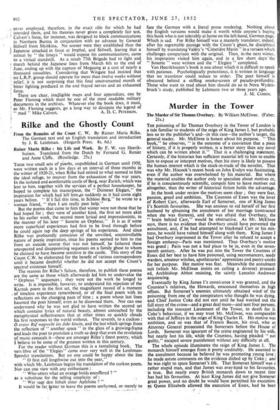Rilke and the Ghostly Count
From the Remains of the Count C. W. By Rainer Maria Rilke. The German text and an English translation and introduction by J. B. Leishman. (Hogarth Press. 8s. 6d.) Rainer Maria Rilke : his Life and Work. By F. W. van Heerik- huizen. Translated from the Dutch by Fernand G. Reiner and Anne Cliffe. (Routledge. 25s.) THESE two small sets of p-oerhs, unpublished in German until 1950, were written each in a few days at an interval of three months in the winter of 1920-21, when Rilke had retired to what seemed to him the ideal refuge, to recover from the exhaustion of the war years. In the isolated and comfortable castle of Berg, near Zurich, which was lent to him, together with the services of a perfect housekeeper, he hoped to complete his masterpiece, the " Duineser Elegien," the inspiration for which had left him ,as suddenly as it had come eight years before. " If I fail this time, in Schloss Berg," he wrote to a woman friend, " then I am really past help." But the poems that came to him that winter were not those that he had hoped for ; they were of another kind, the first set more akin to his earlier work, the second more lyrical and impressionistic, in the manner of his later Sonette an Orpheus." It is as if some more superficial experiences had first to be lived through before he could again tap the deep springs of his experience. And since Rilke was profoundly conscious of the unwilled, uncontrollable nature of poetic inspiration, since his poems seemed to him to rise from an outside source that was not himself, he fathered these unexpected and disappointing sequences on a family ghost to whom he claimed to have become sensitive in the castle. This story of the Count C.W. he elaborated for the benefit of various correspondents until it became doubtful whether he did not accept the Count's spectral existence himself. The reasons for Rilke's failure, therefore, to publish these poems are the same as those which afterwards led him to undervalue the " Orpheus " sequences ; they were not the work he longed to write. It is impossible, however, to understand his rejection of the Karnak poem in the first set, the magnificent record of a moment . of timeless experience remembered, or of the final poem with its reflections on the changing pace of time ; a poem whose last lines haunted the poet himself, even as he disowned them. Nor can one understand why he was not glad to have written the second set which contains lyrics of natural beauty, almost untouched by the metaphysical- reflectiveness that at other times so quickly clouds his first responses to the world without. The seventh, to a cuckoo : 0 erster Ruf wagrecht ins Jahr hinein, and the last which springs from the reflection of " another space " in the glass of a growing-frame and leads the poet to postulate a truth so deep that even the revelation of music conceals it—these are amongst Rilke's finest poetry, which I believe to be some of the greatest written in this century.
For the reader without German this is a tantalising book. The vers libre of the "Elegies" came over very well in the Leishman- Spender translations. But no one could be happy about the line " 0 first call lengthwise out into the year," with which Mr. Leishman begins his translation of the cuckoo poem. Nor can one view with any enthusiasm " Who utters what an orange holds encoffered ? "
as a substitute for the telling simplicity of : Wer sagt den Inhalt einer Apfelsine ? "
It would be far kftter to leave-the poems unrhymed, or merely to face the German with a literal prose rendering. Nothing about the English versions would make it worth while anyone's buying this book who is not tolerably at home on the left-hand, German page. Which is sad. For Rilke himself was a masterly translator; indeed, after his regrettable passage with the Count's ghost, he disciplined himself by translating Valery's "Chnetiere Marin" in a version which challenges comparison with the original. Then, in the next winter, his inspiration visited him again, and in a few short days-the " Sonette " were written and the "Elegien " completed.
Van Heerikhuizen's book is one about which it is difficult to speak with patience. Psychologically pretentious, it is written in language that no translator could reduce to order. The poet himself is obscured behind a stifling smoke-screen of pseudo-profundity. Those who want to read about him should do so in Nora Wyden- bruck 's study, published by Lehmann two or three years ago.
J. M. COHEN.


































 Previous page
Previous page